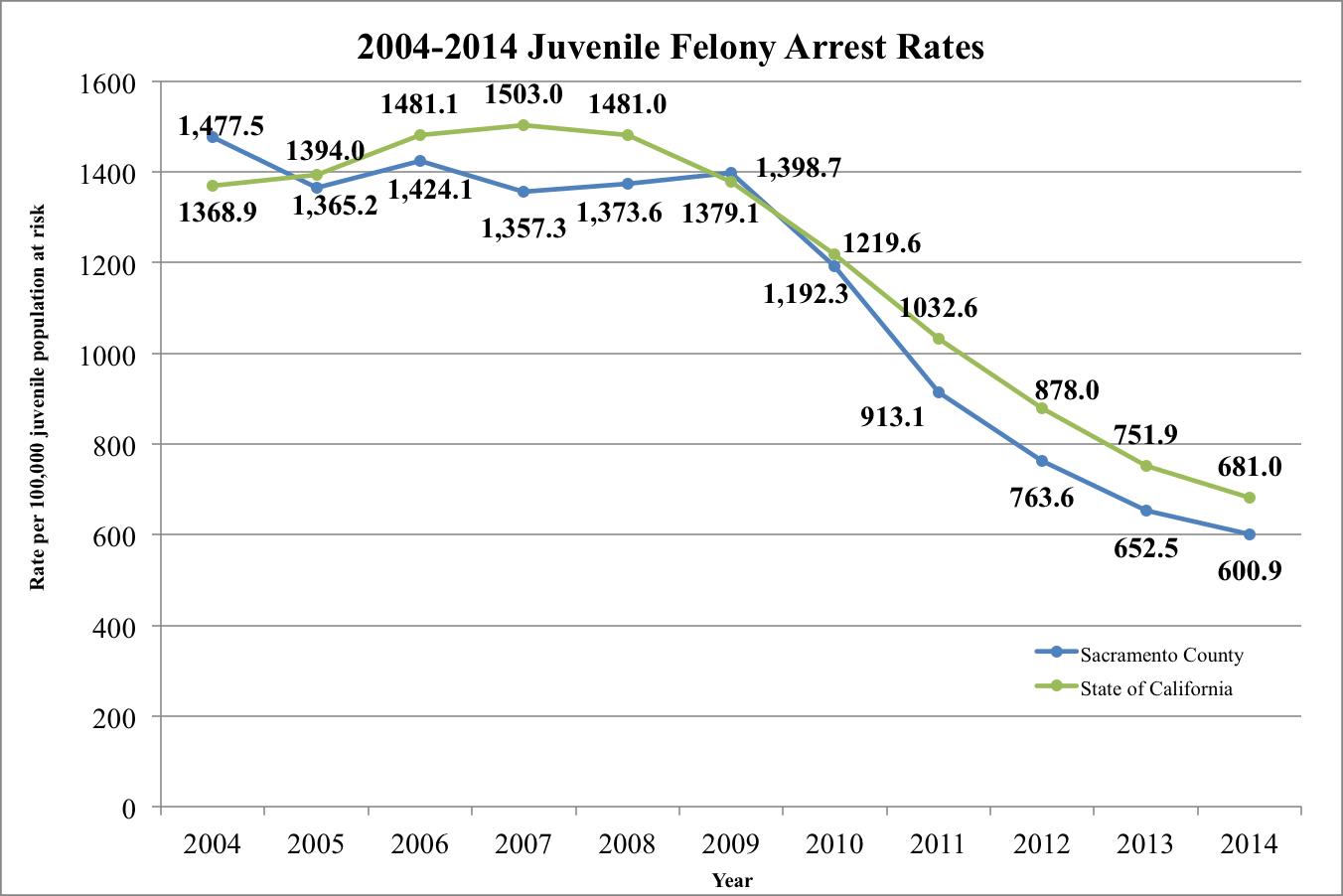Sacramento, CA. August 10, 2015 – Recently released data from the California Attorney General’s 2014 Crime in California report shows that California’s juvenile felony arrest rates continue their sharp decline. The rate for 2014 is less than half of what it was a decade earlier.
The juvenile felony arrest rate for Sacramento County shows a similar decline. The rate for Sacramento County continues to be lower than the statewide average.

There is no consensus among experts as to the cause of the statewide decline. They point to a number of possible causes: increased use of risk and needs instruments to better deliver rehabilitative programming, stepped-up prevention efforts, better community-based alternatives to incarceration, changes in school discipline practices, changes in policing practices and laws, improvements in treating drug abuse and addiction, and the passage of Senate Bill 81 (2007) which realigned California’s juvenile justice system from the State to the counties by dramatically reducing the number of youth in state juvenile justice facilities and passing the savings to the counties in the form of block grants.
The Sacramento County Probation Department has implemented a number of evidence-based practices in its juvenile operations over the last decade, such as the Positive Achievement Change Tool, a risk and needs assessment, in 2006; a detention risk assessment to determine which youth are appropriate for custody in the juvenile hall, in 2007: department-wide training in risk and needs assessment, trauma-informed practices, motivational interviewing, and other evidence-based practices in 2008 and after; and a variety of community-based, research-supported, cognitive-based behavioral treatment programs such as Multi-Systemic Therapy, Family Functional Therapy, and wraparound services that include mental health treatment and drug treatment.
“The community-based interventions we’ve implemented to serve Sacramento County youth are proven strategies to keep kids from getting re-arrested and returned to custody,” says Assistant Chief Probation Officer Mike Shores. “We’re proud that our community is safer, but our work is not done.”
Over the past year, the Sacramento County Probation Department has launched a number of new initiatives that are currently underway, including:
The Education-Based Supervision Model, a new approach to traditional community oversight of youthful offenders was created by the Department to align educational goals with the goals of rehabilitation and partners probation officers with school districts to better support outcomes such as attendance and graduation rates while reducing truancy and at-school incidents.
Increased programming in the department’s Youth Detention Facility, including vocational training, swim instruction, music lessons, gardening, and reentry services.
An expansion of wraparound treatment services aimed at both youth and their families with the goal of reducing the number of youth removed from their homes and placed into the foster care system.
An expansion of services and supervision aimed to reduce African-American child deaths.
The Cross-Over Youth Practice Model, in partnership with Child Protective Services, the Court, and other stakeholders, to better work together to serve youth in the dependency systems and prevent them from “crossing over” into the criminal justice system.
Leadership in Sacramento’s “My Brother’s Keeper” plan, responsible for milestone six (“all youth remain safe from violent crime and have a second chance”).
“We are working with our partners in law enforcement, the Department of Health and Human Services, the District Attorney’s Office, the Public Defender’s Office and the Courts to transform the juvenile justice system in Sacramento County,” Shores explains.
Approximately 3,300 youth in Sacramento County are under the jurisdiction of the Sacramento Probation Department. Approximately 190 youth are in the department’s Youth Detention Facility. The department provides clients with the assessment, treatment, supervision and support necessary to prevent re-offending, resulting in a safer community.
Contact: Mike Shores (916) 875-0567
